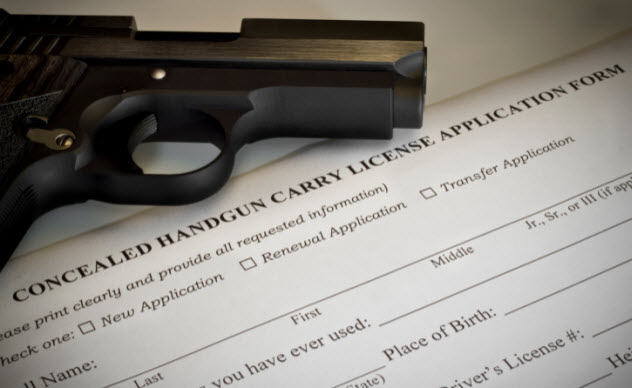 Mysteries
Mysteries  Mysteries
Mysteries  History
History 10 Surprising Stories About the Texas Rangers
 Humans
Humans 10 Philosophers Who Were Driven Mad by Their Own Theories
 Miscellaneous
Miscellaneous 10 Video-Game-Worthy Weapons and Armors from History
 Weird Stuff
Weird Stuff 10 Psychics Who Accurately Predicted Wartime Events
 The Arts
The Arts 10 Pieces of Art Inspired by a Broken Heart
 Health
Health 10 Science Fiction-Sounding New Medical Treatments
 History
History 10 Surprising Facts About the Father of Submarine Warfare
 Space
Space Ten Astonishing New Insights into Alien Worlds
 Weird Stuff
Weird Stuff 10 Bizarre Summer Solstice Rituals Still Practiced Today
 Mysteries
Mysteries Top 10 Haunting Facts About the Ghost Ship MV Alta
 History
History 10 Surprising Stories About the Texas Rangers
 Humans
Humans 10 Philosophers Who Were Driven Mad by Their Own Theories
Who's Behind Listverse?

Jamie Frater
Head Editor
Jamie founded Listverse due to an insatiable desire to share fascinating, obscure, and bizarre facts. He has been a guest speaker on numerous national radio and television stations and is a five time published author.
More About Us Miscellaneous
Miscellaneous 10 Video-Game-Worthy Weapons and Armors from History
 Weird Stuff
Weird Stuff 10 Psychics Who Accurately Predicted Wartime Events
 The Arts
The Arts 10 Pieces of Art Inspired by a Broken Heart
 Health
Health 10 Science Fiction-Sounding New Medical Treatments
 History
History 10 Surprising Facts About the Father of Submarine Warfare
 Space
Space Ten Astonishing New Insights into Alien Worlds
 Weird Stuff
Weird Stuff 10 Bizarre Summer Solstice Rituals Still Practiced Today
10 Bizarre Facts That Will Make You Lose Faith In The Modern World
Longer life expectancies, ever-improving medical technology, and amusing list-based websites are just some of the treasures the early 21st century has bestowed upon us. But we’d be lying if we pretended that everything was peachy. Even as some things improve, there are signs that the universe is getting collectively dumber, meaner, and weirder. It’s enough to make you lose faith in the sanity of the modern world.
10 You’re More Likely To Get Bitten By Another American Than A Rat

Picture the scene. Hordes of humanlike creatures shuffle down the streets of a city, rabidly biting any poor soul who crosses their path. If that sounds like a scene from a zombie apocalypse movie, we’ve got some terrifying news for you. According to statistics, that’s modern America.
Every year in America, adult humans bite the living heck out of one another. In 2012, over 40,000 ER visits were recorded in the US for human bite wounds—roughly equivalent to the entire population of Liechtenstein. To put that in perspective, that’s more than 10 times the number of Americans bitten each year by either rats or nonvenomous reptiles. Statistics from nonurban, rat-free areas aren’t skewing things, either. Even in a high-density rat wonderland like New York City, you’re far more likely to be bitten by a fellow human than a wandering rodent.
This isn’t to say that humans have taken over as America’s most bitey creatures. Dog bites still dwarf all other kinds, with nearly 340,000 reported each year. But when you have to worry more about your new roommate gnawing on your face than the giant hell rats infesting your block, it’s clear that we as a species are doing something terribly wrong.
9 American Toddlers Are Shooting One Person A Week

On October 12, 2015, a two-year-old kid in South Carolina picked up a gun and promptly shot his grandmother. The story made a few headlines but didn’t attract any real attention until The Washington Post’s Wonkblog picked up the story. After crunching the numbers, they came up with this jaw-dropping fact. In 2015, American toddlers have on average shot one person a week.
Their analysis defines a toddler as a kid aged three or under and includes incidents where the toddler shot themselves. Still, the numbers are staggering. By October 14, 2015, toddlers had shot and killed two people, shot and injured 10 others, and shot themselves 18 times. An additional 13 toddlers had killed themselves, including a 21-month-old in St. Louis who picked up his grandmother’s gun and blew a hole in his own torso.
Their data also picked up a couple of geographic trends. Missouri is the toddler-shooting capital of the US, with five incidents reported there from January 2015 to mid-October 2015. Florida comes in second with four. California, the Upper Midwest, and New England have no toddler shootings so far. While the data set is probably too small to draw any conclusions, it’s mind-blowing to think that there is a data set in the first place.
8 Sex Toy Injuries Soared After Fifty Shades Was Published

You’ve probably heard of a little book called Fifty Shades of Grey. A publishing phenomenon, it brought S and M careering into the mainstream and triggered roughly a trillion awkward conversations. It also showed just how stupidly quick most of us are to jump on the latest bandwagon. Following the book’s publication in 2011, sex toy–related injuries almost doubled.
Of course, no one is saying that the book was responsible for people’s actions. Sex toy injuries have been steadily rising since 2003, with nearly 1,500 recorded in 2005. In 2011, these injuries peaked at over 1,500 for only the second time since we began keeping records. When Fifty Shades became a global phenomenon in 2012, sex toy injuries soared past 2,500.
The injuries themselves were as uncomfortable and amusing as you’d expect. Eighty-three percent were what doctors euphemistically refer to as “foreign body removal.” Nearly 60 percent of those involved were men, most in their forties or fifties. The greatest number of women were in their twenties, exactly the age group that Fifty Shades might have influenced to experiment.
7 If You’re Poor, You’re More Likely To Die In A Car Crash

Death is the great leveler, or so the saying goes. But whoever coined it evidently didn’t have access to federal statistics on car accidents. While traffic accidents have generally been declining for years, there’s one sector of society where they’ve actually gotten worse. The least educated and poorest are now far more likely to die in a car crash than anyone else.
If you don’t have a high school diploma, your chances of dying in an automotive accident are 4.3 times greater than someone with a college degree. As The Washington Post points out, this doesn’t necessarily mean the less educated are worse drivers. Instead, they’re frequently forced to live in environments where their safety is less assured. In general, their cars are older and have lower crash test ratings. Their lower incomes mean that they often can’t afford all the extra air bags or rear cameras in newer models. Their towns or cities are likely to be less safe, too. Poor, rural areas have far fewer trauma centers, and roads in poor districts have fewer stop signs, crossings, and speed bumps.
Taken together, this adds up to a lethal cocktail. Death may come to us all. But if you’re poor and own a car, it’s far more likely to come for you when you get behind the wheel than it is for anyone else.
6 If You’re Female And Educated, You’re Less Likely To Find A Date

Since 1981, America’s colleges have gone from all-male bastions of sexism to predominantly female environments. Right now, the average campus has a ratio of 57 women to 43 men, a sure win for the sisterhood. While this is a great example of progress, there is one area where it’s affecting the fairer sex negatively. College-educated women are finding it increasingly difficult to get dates.
The trouble is that the majority of us tend to marry into our own class, a fact even more pronounced now than it used to be. That’s all well and good if the dating pool is full of middle-class, college-educated men, but that’s frequently no longer the case. For college-educated people in their thirties, the dating pool currently has five women for every four men. Switch your focus to those in their twenties, and it drops to four women for every three men. In Manhattan, there are 38 percent more college-educated women under 25 than there are men. In Miami, that rises to a staggering 86 percent.
The unintended effect is a dating market where educated women are suddenly struggling to find prospective partners, which seems a deeply unfair way to reward gender progress. However, there are a couple of silver linings. If you’re an educated female and have a thing for blue-collar men, you’ve got your pick of the bunch. Equally, if you’re an educated male, you’re now a prized commodity. In Fort Lauderdale, for example, there are 171 eligible, college-educated bachelorettes for every 100 men.
5 In Some States, Your Health Is Worth A Lot Less Than You Think It Is

What do Texas, Oklahoma, and soon Tennessee and South Carolina have in common (except for geographic proximity)? If you’re a worker in these states, your health is worth significantly less than it is anywhere else in America.
This is because of a new system of opt-outs that companies can apply to workers’ compensation. The idea is to provide flexibility so that companies don’t have to deal with the government in court every time an employee is injured. Although it sounds like a good idea, it can also give a company the right to cheat their workers in the name of progress.
For example, in most states, the loss of a hand while working will entitle you to an average of $145,000 in compensation. In Texas’s opt-out system, some employers, like Home Depot, will pay a maximum of $1 million if you lose your hand in a work-related injury. But many other companies will pay a maximum benefit of only $50,000 for the same injury.
This means that everything from your limbs to your eyes to your life is worth less as a worker under Texas or Oklahoma law than elsewhere in the US. Some cases are particularly egregious. For example, Costco will pay up to $600 of the cost of an external hearing aid for an employee who loses his hearing on the job. Yet the cheapest external hearing aid that Costco sells is $900. In other cases, failing to report an injury by the end of your shift—even if that happened because you were spaced-out on morphine in an emergency room—can result in your receiving literally nothing.
4 Your Name Can Have A Truly Ridiculous Impact On Your Life

Names can have a weird impact on our lives. You’ve probably heard that job applicants with black names are 33 percent less likely to receive a callback than applicants with white names. But that’s only the tip of the iceberg. It turns out that names can affect us in more ridiculous ways than we ever imagined.
For example, a 2002 report by a Gallup analyst found that we have a tendency to enter a profession that resembles our first names. So there are a statistically unlikely number of dentists called “Dennis” and lawyers called “Laura.” Not only that, but seashell shops are more likely to be owned by a “Sheryl” than a “Cheryl,” and women with the name “Georgia” are more likely to move to Georgia. It’s like we’ve all swallowed the kid’s TV Guide to naming characters and worked backward from there.
Keep digging, and the findings move from plain weird to slightly disturbing. Having a surname that’s higher in the alphabet has been shown to correlate with success, especially among older generations. Boys who have asexual names like Hillary are more likely to misbehave in school while girls with feminine names are less likely to study STEM subjects (traditionally seen as masculine). Teenage boys with rare names are more likely to become involved in crime while teachers use traditionally lower-class names to predict which kids will misbehave. In short, our names apparently affect every aspect of our lives.
3 Some Campuses Are More Likely To Ban Toy Guns Than Real Ones

It’s no secret that Texans love their guns. Just recently, the state enacted a law allowing concealed carry on college campuses—something a number of other states have also done. We’re not here to debate whether this is a good or bad idea. We have an entire gun-specific article in which we discussed that sort of thing. What we will say is that this new law created some utterly ridiculous contradictions. Some Texas campuses now consider it more troubling for students to own toy guns than real ones.
At Texas A&M University, dorm rules specifically ban toasters, candles, and NERF guns. However, as of 2016, they will allow students to keep real guns. Texas isn’t alone in this. Some Colorado campuses have enacted similarly absurd bans while allowing concealed carry.
Perhaps craziest of all is the Texas law regarding sex toys. When the campus concealed carry law becomes effective in 2016, it will be considered a greater offense to publicly display a vibrator than a weapon. In fact, the vibrator will set you back a $500 fine. Then again, it could just be that Texas has finally awakened to the public health risk our sex toys pose.
2 Your Love Life Is Related To Your Credit Score

What do you look for in an ideal partner? If you went for anything boring like shared interests, compatibility in the bedroom, or an appreciation for badly spelled Marvel fanfic, we’ve got some bad news. Your relationships could well be doomed. According to a recent report by the US Federal Reserve Board, one of the most important factors in a relationship’s success is compatible credit scores.
As a metric for gauging how trustworthy you are with credit, your credit score is like your school’s “permanent record” updated for the adult world. A good score means you can take out personal loans, get a mortgage, and so on. A bad one means your bank manager will split his sides laughing if you ask for a new credit card.
When a trio of economists looked through the Fed’s records, they discovered that people tended to enter “committed relationships” with someone who had a similar credit score. A “committed relationship” was defined as two non-blood relatives living at the same address even if they weren’t married. These economists also found that couples with good credit scores were less likely to separate.
Why might this be? Well, those who wrote the paper have suggested that your credit score may be a reflection of what you’re like in life. Those who pay their debts on time and manage their money well are more likely to remember birthdays, clean the house, and so on. How far this is true is another matter, but it’s still depressing to know that your love life is at the mercy of something as dull and passionless as a credit score.
1 The Richer You Are, The Longer You’ll Live

Remember when we said that death was the great leveler except where car accidents are involved? Turns out that’s not quite true. Although life expectancy is rising overall, this shift masks a worrisome trend: Life expectancy for the richest now far outstrips life expectancy for the poorest.
For US men born in 1930, being in the bottom 20 percent of income meant having a life expectancy of 76.6 years when they hit age 50 in 1980. For men born in 1960, it was essentially the same. By the time they hit their 50th birthdays in 2010, they could expect to live a total of 76.1 years. This doesn’t seem so bad until you compare it with those in the top 20 percent of income. In that same time period, their life expectancy leaped from 81.7 to 88.8 years.
That means that America’s richest can now comfortably expect 12 more years of life than their poorest counterparts, up from the extra five years that they would have enjoyed 35 years ago. It’s not just the US that’s seeing this trend, either.
In Britain, inhabitants of wealthy Chelsea can already expect to live six years longer than those in struggling Tower Hamlets less than 2 kilometers (1 mi) away. That’s the same as the difference between the UK’s average life expectancy and Vietnam’s. Looks like death is a sucker for inequality.








